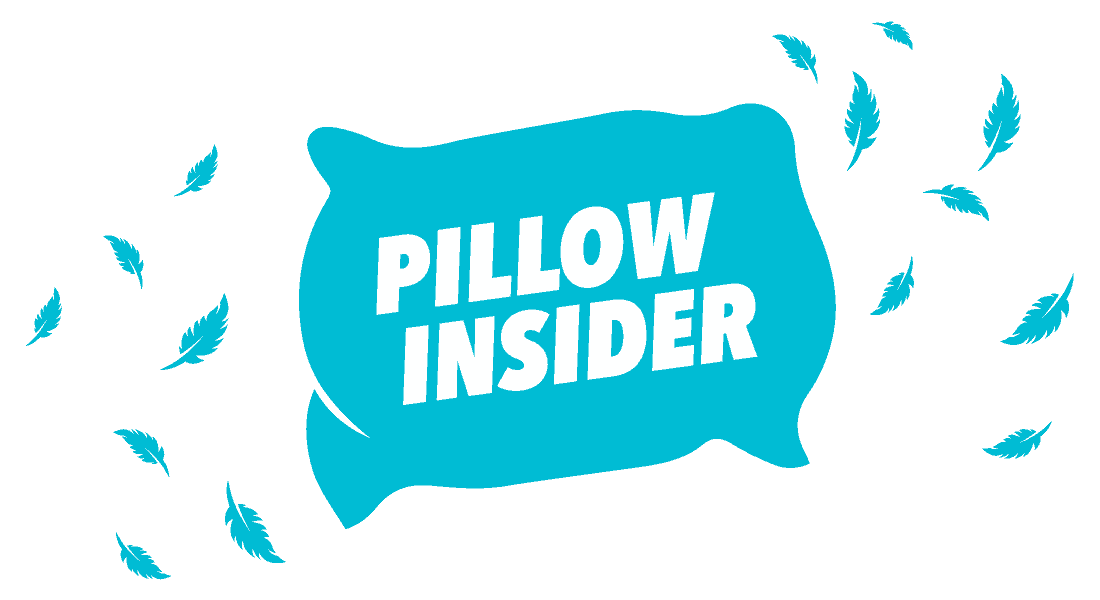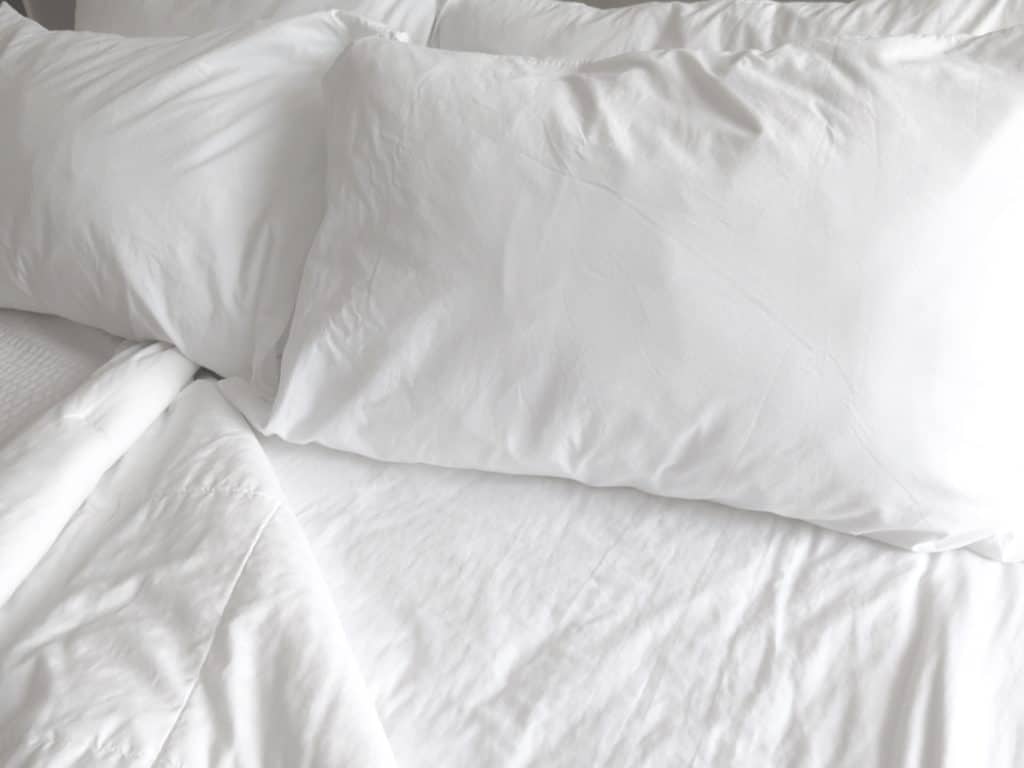No matter how expensive or luxurious your new white bed sheets are, they will fade into a grimy yellow after usage. With complimentary pillow shams, bed throws, duvet covers, and decorative pillows, a crisp, white bed looks incredibly inviting and swoon worthy. Though this sparkling white is bound to stain easily and even your regular washing cycles will not be enough to maintain that crisp color.
While they may be aesthetically pleasing, white sheets certainly require care and proper maintenance to keep them from yellow stains. There are some foolproof tricks that you can use to prevent this and maintain the fresh, sparkling white glean on your sheets for much longer.
Why do my bed sheets turn yellow?
White bed sheets are notorious for staining easily and fading into a dull, putrid shade of yellow. Regardless of regular washing, your white sheets may retain the yellow hue for a variety of reasons which may require alternative solutions.
The reason why your white bed sheets may turn yellow is because when you sleep at night, you leave several impurities and other leftovers behind on your sheets, which then soak deep into its fibers. This includes traces of sweat, dead skin cells, dander, skin oils, cosmetic remnants, etc. The accumulation of these impurities and debris can lace the top of the sheet and eliminate the white sparkle that comes with a brand new, white bed sheet. The more you use it, the more you will notice the yellow tint.
How to get yellow stains out of white sheets
While regular washing may not be successful in cleaning the yellowness out of your white sheets, you can still use some tips and tricks that have proven to be extremely effective in draining the impurities and debris out of your expensive bed sheets.
Bleach
Using a pinch of bleach when washing your sheets can do wonders! Bleach is known for its whitening characteristics and if you wish to wash the yellow stains out, you can sprinkle some during regular washing machine cycles.
To get the most out of bleaching your sheets, wash them regularly and add just half a cup of bleach in the machine and run it on a regular or soft cycle.
Alternatively, you can also opt for a non-chlorine oxygen bleach as the other variety might react negatively with stains on your bed sheet such as saliva or skin oils, etc. Oxygen bleach can rectify this and keep your bed sheets free of disgusting marks and yellow stains.
Vinegar
A tried and tested method of washing out the yellowish hue from your white bed sheets is by using a quarter or half a cup of distilled white vinegar to your machine’s fabric softener compartment. White vinegar is applauded within the home-care community for its natural fabric softening quality, as well as its ability for neutralizing nasty odors.
We recommend pre-soaking your bed sheets in distilled white vinegar before you toss them in the washer. Simply add quarter or half a cup of vinegar in a gallon of lukewarm water and soak your sheets and pillow covers for at least two to three hours. You can easily wash them with a gentle detergent and dry them through later to eliminate the lingering smell of vinegar.
Borax
The powdery white mineral agent is known for its whitening abilities when washing white clothes or bed sheets. You can add half a cup of borax to a gallon of warm water and gently submerge your sheets in the solution for at least five to six hours, or overnight if possible. You can wash them in the machine with a mild detergent and your sheets will come out brighter than ever!
Borax is widely used to fight stains and stubborn marks from clothing. In fact, it is also used to kill bacteria, molds, or even insects within your bedding. Its whitening laundry booster abilities make it a foolproof method of removing yellow tints and stains from your white bed sheets.
Liquid Bluing
Liquid bluing is extremely easy and convenient to use when washing away stubborn yellow hues and other stains from your white bed sheets. The blue color in the solution helps to neutralize the sharp yellow tint, but it does rinse away after a while so it may not be the most long-lasting solution.
Simply begin by diluting a teaspoon of liquid bluing agent in a gallon of water and make sure to never bring the solution in contact with your sheets directly as the chemical might stain the fabric permanently. You can then pour the diluted solution inside your machine drum along with a regular or mild detergent. Run the washing cycle on a soft or medium setting and behold the sight of pristine white sheets!
Lemon Juice
One of the most popular whitening agents used for laundry is lemon juice, thanks to its citric acid and natural bleaching abilities. Simply squeezing the juice of one lemon into your washing machine, along with a mild or regular detergent, can make your white bed sheets shine brighter than ever before!
Citric acid is a natural bleaching agent that whitens your sheets without using any harsh, damaging chemicals. You can either simply put some lemon juice in the wash with your detergent or mix half a cup of fresh lemon juice with a gallon of water and leave your bed sheets to soak overnight.
Hydrogen Peroxide
The most effective way to use hydrogen peroxide as a whitening agent for laundry is by mixing it with another cleaning ingredient such as baking soda. Do not mix it with bleach, vinegar, or lemon juice as these might cause staining. Pour one cup of hydrogen peroxide into the machine drum and machine wash as usual for cleaner, whiter sheets.
How to keep yellow stains out of white Sheets?
Once you take the steps to clean them thoroughly, you will learn how to avoid yellow stains and nasty hues on your bed sheets in the first place. Some basic steps can be followed as precaution against yellow stains on white sheets and these can make life a lot easier when doing your laundry.
Wash your face before hitting the bed
Face oils, dead skin, dander, dirt, pollutants, makeup remnants, etc., can really pile up on your sheets and leave behind nasty yellow hues. When we do not wash our face frequently, the dirt and impurities from the pores of the skin seep and soak into the fibers of your sheets, creating a yellow tint. Therefore, it is recommended to wash your face thoroughly before heading to bed.
Launder regularly
It does not matter if you shower or clean up regularly before bed because your body still leaves behind dead skin cells, hair, sweat and body oils, etc. These impurities accumulate in the fibers of your sheets and become a nesting spot for allergens, insects, dust mites, mold, and bacteria. You may notice difficulty breathing, runny nose, sneezing and wheezing, skin reactions, and a sore throat because of these remnants.
Washing your sheets regularly, or at least once a week, is paramount. When washing, we also recommend running your sheets through a second cycle to clean away traces of detergent. Leftover detergent can also cause discoloration and shabbiness, so only the recommended amount as using it in excess can also cause patchiness.
Avoid Fabric Softeners
While they smell incredible and leave your clothes feeling silky smooth, fabric softeners are notorious for causing discoloration due to their strong chemical ingredients that do not rinse well. By using them frequently on your white bed sheets, you may notice your sheets losing their brightness and becoming a pale bone white, or yellow.
A better alternative is using vinegar as a fabric softener that washes away just as easily and leaves you sheets feeling silky and fresh.
Avoid Eating in Bed
Food spills and stains will ultimately cause stubborn marks that will be difficult to wash out. Consistent washing may cause discoloration and food items such as wine, oil, coffee, or tea, may leave permanent marks that eventually result in your white bed sheets turning yellow. It is best to avoid eating in bed altogether to avoid this from happening.
Wash Whites Separately
It goes without saying that when you are doing your laundry, it is best to separate the colored items from the whites so that excess color does not seep into the latter. Color bleeding is very common but can be terribly hard to wash out. Keep your white bed sheets sparkling clean by never mixing them with colored clothing. If you notice your sheets turning slightly yellow, then you may have mixed it with yellow clothing items in the wash.
Frequently Asked Questions
How do hotels keep their sheets so white?
Hotels keep their sheets pristine white by often soaking their bedding and other linen tubs of cold water and a mixture of detergent and baking soda. They will continue to boil them in this mixture and wring them out halfway through. Other times, hotels will use a three-pronged system that includes regular washing, bleaching, and thorough drying to keep their sheets sparkling.
Can you use bleach on white sheets?
You can use bleach to restore the whiteness of your sheets or even wash out stubborn stains. It is important to remember that bleach must only be used on washed white bed sheets as it might otherwise react to the remnants of bodily fluids, makeup, etc., on them.
How often should you wash your bed sheets?
You should wash your bed sheets every four to five days, depending on how often you sleep on them. If you sit, eat, or sleep on the same sheets often, then you may want to wash them more than once a week.
Should you wash sheets in hot or cold water?
You should wash light colored cotton sheets in lukewarm or hot water as this helps to exterminate bacteria and other allergens. It is best to always read any labels provided as the instructions might differ depending on the fabric.
Does baking soda remove yellow sweat stains from sheets?
Baking soda is widely used for its terrific whitening abilities and elimination of bad smells. By mixing half a cup of baking soda with your ordinary detergent, you can easily remove yellow sweat stains from your sheets and leave them smelling fresher than ever.

